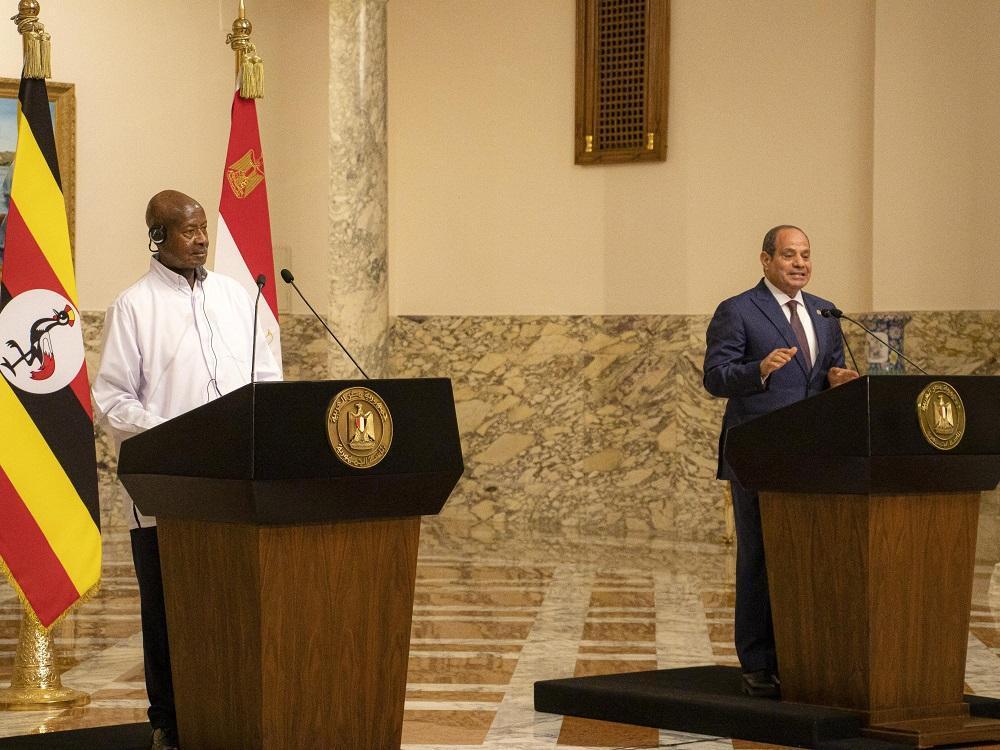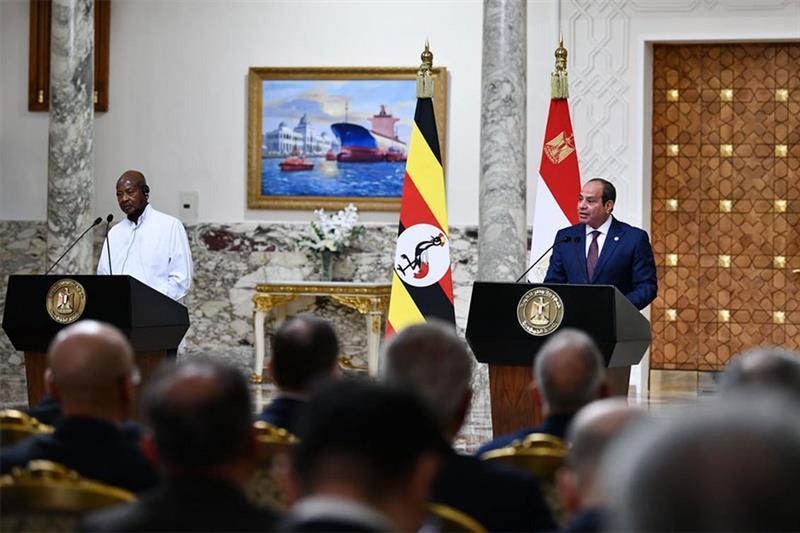By Faridah N Kulumba
Africa-Press – Uganda. On 11th this month President Yoweri Kaguta Museveni arrived in Cairo, the capital of Egypt, for a three-day working state visit at the invitation of his host and counterpart, Abdel Fattah El-Sisi to strengthen the two nations relations and also signed Memorandum of Understandings (MoUs).
According to the spokesman for the Presidency, Ambassador Mohamed El-Shennawy, President El-Sisi and the Ugandan President held a closed meeting, followed by an expanded session of talks joined by the two countries’ delegations. The two sides discussed ways to enhance the historic relations between Egypt and Uganda. They agreed to forge closer cooperation, notably in the political, commercial, and investment spheres, in a manner that serves the common interests of the two brotherly peoples. Museveni’s tour to Egypt happened just days after he met and held bilateral talks with the Egyptian delegation led by the Foreign Minister, Dr. Badr Abdelatty in Uganda.
Nations address
During the visit the two leaders pledged to deepen the historic ties between Uganda and Egypt, anchored by the River Nile and strengthened through decades of Pan-African solidarity. This was revealed during a joint press conference. In his statement President Museveni said Uganda and the Great Lakes region are linked to Egypt by the Nile from ancient times. Politically the two countries’ closeness began in 1952 when President Nasser took leadership. Before that, they had little contact, but Nasser, as an Africanist, worked closely with leaders such as Julius Nyerere, Kwame Nkrumah and supported the anti-colonial movement. “When we came into government, we started working with the leaders at that time.” The President stressed that the future of the Nile must be approached with a wider vision. “Sometimes, the problem is the approach. Instead of limiting ourselves to historical rights, we should focus on the global needs of all Nile Basin countries,” Museveni said. On the other hand President El-Sisi highlighted cooperation in water resource management, agriculture, veterinary disease control, natural resource development, and the energy sector. He stressed that Egypt will always uphold international law to protect the Nile while supporting the development of other Basin countries. “Egypt has no other water source; we don’t have rainfall. The Nile is life for us. We are not against development in any Basin country, but we call for equitable sharing of water resources. We must coexist and ensure that development does not harm the people who depend entirely on this river,” he said. He revealed that the Nile annually carries more than 160 billion cubic meters of water, with 85 billion cubic meters coming from the Blue Nile, much of which is used for agriculture. “This is why water is extremely critical for Egypt. Our people are deeply concerned about it, and we trust Uganda’s role in fostering agreements among Basin countries,” he added. President El-Sisi closed by expressing gratitude to his Ugandan counterpart. “I thank President Museveni and welcome him to Egypt. Our discussions have demonstrated great understanding and a shared vision for the future.”
Signed MoUs
Uganda and Egypt signed a series of landmark Memoranda of Understanding (MOUs) in the key sectors of trade and investment, agriculture, water management, and community development. These were signed between the ministers from both countries.
The first agreement signed was security, and diplomatic cooperation. This was followed by the signing of a foreign affairs cooperation framework aimed at strengthening political dialogue and regional coordination. The agriculture agreement was also signed. Both nations also formalized partnerships in agricultural technology transfer, land reclamation, and community development projects, economic growth, trade, investment, and joint ventures, and water security and environmental sustainability were also high on the agenda cementing cooperation in water resource management, irrigation development, and environmental protection.
Egypt’s Objectives in strengthening ties with Uganda
Uganda and Egypt both share the longest River in the world, the Nile River. The rivers originated from Uganda, so it’s vital for Egypt to maintain a good relationship with Uganda due to shared partnerships. This is one of the reasons why both nations are working on joint projects related to dam construction, groundwater harvesting, and irrigation along the Nile basin. This cooperation is vital for Egypt to ensure sustainable water access and to mitigate potential conflicts related to water resources. Historically, Egypt has been heavily reliant on the Nile for its water supply and has worked to ensure its access to water resources through agreements and technical projects.
The relationship between Uganda and Egypt represents a prominent model for Egypt’s relations with African and Nile Basin countries based on expanding and developing areas of cooperation through mutual visits between the leaderships of the two countries or at the level of joint committees. During the Uganda and Egyptian leaders’ meeting in Cairo President Al-Sis said that Egypt sees Uganda as a key partner in the southern Nile Basin region, and they seek for Uganda to be one of the biggest beneficiaries of Egyptian mechanisms dedicated to supporting development in Nile Basin countries.Economically Uganda is one of African countries that imports more Egyptian food. Egyptian food industries exports to Uganda recorded USD 18 million during 2020, a growth rate of 16 percent compared to 2019, as Uganda occupies the 41st place in the list of the most important importing countries for Egyptian food industries in 2020.

Egyptian food industries exports to Uganda in 2020 amounted to USD 18.2 million, a growth of 16 percent compared to exports in 2019 out of total Egyptian food exports amounting to USD 3.2 billion in 2020, and exports for the first quarter of 2021 amounted to about USD 4.1 million. Recently, while the Egyptian president was addressing the business forum said, “We look forward to raising the level of economic cooperation and increasing the volume of trade exchange, which reached about USD 133m in 2024, and we aspire to double it to reflect our shared potential,” he added. Egypt is strategizing their opportunities of being one of the top Ugandan Investors. Uganda is rich in natural resources and offers a wide range of investment opportunities. Some popular sectors for investment include mining, oil and gas, real estate, technology, and infrastructure.
The few years has seen many Egyptian companies increasing to invest in Uganda including the Arab Contractors Company which is implementing infrastructure projects with foreign bank loans for the benefit of the Ugandan government. Mantrac Company, owned by Mansour Group of Companies. Power of attorney of Mac east Africa, a subsidiary of Mansour Companies.
Innovative Research and Development to combat malaria with the latest technology. Evergreen Corporation Shipping. Qalaa Holdings has acquired a 51 percent stake in RVR, which connects the port of Mombasa and Kampala, and is currently facing obstacles in retaining the concession to manage the line. Arab Consultants Company Muharram Bakhoum. Wadi Degla Company has opened a branch in Kampala and is engaged in the field of construction and communications infrastructure.
The Egyptian-Uganda Food Security Company, which opened in August 2016 the newest automated slaughterhouse in the East African region with an investment of about USD 10.5 million, as well as some agricultural and livestock investment projects, a project of particular interest to President Museveni, the first Ugandan meathenna was exported to Egypt amounting to 50 tons during August 2018. Egypt attaches great importance to strengthening its relations with African countries, especially the Nile Basin countries, and in light of the reform vision adopted by Ugandan President Museveni for development in his country, Egypt is keen to continue its active role in promoting bilateral cooperation in various sectors.
Uganda comes at the top of the African countries receiving Egyptian grants, and the Egyptian Agency of Partnership for Development is one of the most effective tools to strengthen relations with Uganda for its assistance in various fields (police, defence, judiciary, agriculture, water, irrigation, energy, health, diplomacy and media), in addition to the courses offered by the armed forces, the Egyptian International Center for Agriculture, the Ministry of Electricity, the Cairo Training Center for Conflict Resolution and Peacekeeping in Africa, the Police Research Institute, and the African Media Training Institute. Are Uganda and Egypt recent engagements tempted to encircle Ethiopia the Grand Ethiopian Renaissance Dam?
The Nile River flows through eleven countries, and has been a center of heightened hostilities and disputes among the basin states throughout its history. These hostilities and disputes have escalated, particularly between the two eastern Nile basin states of Ethiopia and Egypt, since the construction of the Grand Ethiopian Renaissance Dam (GERD) began. The disputes between Egypt and Ethiopia started from the moment the project was announced due to contrasting reactions to the project. Ethiopia has called it a project that only aims at generating hydroelectric power for its citizens suffering in perpetual darkness, however, Egypt labelled it as a threat against its historic right and survival. The conflicts between the two nations over the dam have captured the attention of various international actors who are closely monitoring the situation.
According to studies, the political-economic configuration of the Nile has historically been shaped by Egypt’s hegemonic presence in the region. Historically, Egypt controlled the Nile’s upstream waters with a combination of material, ideational, geopolitical resources, and external support.” This political-economic supremacy has been maintained through an array of tactics, including project construction, coercion, pressure, treaties, negotiations, and knowledge construction. Despite challenges from riparian states demanding an equitable share, Egypt has historically been effective in thwarting these competitions through a range of power strategies. Studies show that material, bargaining, ideational, and geographical power, are the commonly used power strategies that allow certain countries to maintain hegemonic power over the other riparian states. Egypt has also historically been effective in using these strategies, except for geographic power, to maintain hydro hegemony over the Nile.
In 2024, One retired diplomat who worked in Uganda’s Foreign Affairs Ministry for two decades said Museveni is one of African leaders respected for his vast experience in regional security affairs. He has defended Ethiopia’s national interest, including the construction of the Renaissance Dam, for a very long time. Ethiopia and Uganda have many years of diplomatic relations. Both countries are signatories of the Nile Basin Agreement – something that Egypt was angry about. Egypt has reportedly been undertaking diplomatic and political campaigns to foil the agreement which was not a success. In a recent meeting with Museveni in Cairo, President El Sisi reportedly said that he will not allow the Nile Water to be touched. Ethiopia has been rejecting Egypt’s monopoly of the Nile water and advocating for equitable use of the Nile River. Uganda and Ethiopia seem to be on the same page when it comes to the use of Nile Water Resource – perhaps the reason why El-Sisi had to tell Museveni that it will not “allow the water to be touched.”
For More News And Analysis About Uganda Follow Africa-Press






